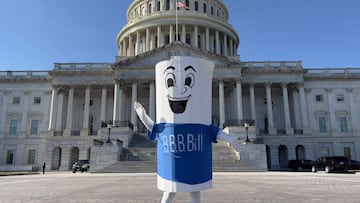Child Tax Credit: How does the $1.2 trillion infrastructure bill affect the payments?
The Child Tax Credit was not extended as a part of the infrastructure bill, its extension is included in the reconciliation bill. Here is the difference.


There is much confusion in the public surrounding the two bills that have been circulating on Capitol Hill since early this summer. The efforts of leaders to tie their fates or argue they are completely separate has left many people wondering which measures, tax credits, and other benefits are included in each.
The two bills are the $1.2 bipartisan infrastructure bill and the $1.75 trillion reconciliation bill.
This spring President Biden unveiled the American Jobs Plan and the American Families Plan, which together with the American Rescue Act form his Build Back Better agenda. The economic agenda aims to set the country up for economic success and ensure that American workers and families are able to thrive in compete in the 21st century. However, its critics have called it a waste of public funds and say that it will only contribute to the national debt and increase inflation.
$1.2 trillion infrastructure bill
After it became clear, that Republicans were not going to support the social spending aspects of the America Jobs Plan, a group of bipartisan senators began working on a focused physical infrastructure bill. This bill stripped many of the measures included to support workers in the care economy. The total package will cost around $1.2 trillion dollars and between 2021 and 2031 will “add $256 billion to projected deficits over that period," according to the Congressional Budget Office (CBO).
The bill passed the Senate in August and the House of Representatives earlier this month. Progressive Democrats had withheld their votes on the package arguing that they would not approve the bill until an agreement on the reconciliation bill was reached and brought to a vote in both chambers of Congress. However, the caucus lost this fight after the party leadership became anxious after seeing the loss of a Democratic governor’s race in Virginia.
Part 1 of the Biden Agenda: ☑️
— Progressive Caucus (@USProgressives) November 15, 2021
Next up: The Build Back Better Act.
This is the week Democrats deliver. This is what we were elected to get done. https://t.co/MOD2My3vBg
$1.75 trillion reconciliation bill
President Biden and many Democrats were elected to Congress campaigning on many of the items included in the reconciliation bill. These promises included expanded Medicare to cover hearing, dental, and vision services, the establishment of a federal paid leave policy, two years of free community college, and more. All of these measures and more were included in one of the first drafts of the bill which had a price tag over $3.5 trillion.
The child tax credit extension forms part of the reconciliation bill, not the infrastructure legislation that has become law. With the reconciliation bill still unpassed, the fate of the credit is unknown. Should Congress not vote to approve the package or pass a separate law extending the credit, it will expire and return to its initial structure; this would mean 24 million children would become ineligible next year.
Related stories

Medicare Advantage Plans: eligibility and how much to pay in 2022

Will Child Tax Credit eligibility change for payments in 2022?
The initial reconciliation bill introduced had a total price tag of over $6 trillion, and was quickly reduced to $3.5 trillion. Beginning in the fall, more conservative Democratic senators like Joe Manchin of West Virginia and Kyrsten Sinema of Arizona began to make their opposition to the package public. Both have warned that the bill would add to the deficit, ignoring that the infrastructure bill they supported will add over $200 billion to the national debt.
I have always said that the best politics is good government, and I’m incredibly proud of my bipartisan colleagues for their tireless efforts to get the Bipartisan Infrastructure Bill across the finish line and deliver on this major investment in the needs of America.
— Senator Joe Manchin (@Sen_JoeManchin) November 6, 2021
The CBO which evaluates the economic impacts of bills has yet to release its full report on the reconciliation bill because the “analysis of the bill’s many provisions is complicated." But, the organization highlighted that they “will provide a cost estimate for the entire bill as soon as practicable.”
- Joseph Biden
- Crisis económica coronavirus Covid-19
- Ciencia
- Finanzas municipales
- Congreso EEUU
- Coronavirus Covid-19
- Crisis económica
- Estados Unidos
- Pandemia
- Coronavirus
- Recesión económica
- Norteamérica
- Parlamento
- Coyuntura económica
- Virología
- Epidemia
- Enfermedades infecciosas
- Ayuntamientos
- Finanzas públicas
- Enfermedades
- Microbiología
- Gobierno municipal
- América
- Medicina
- Administración local
- Economy
- Politics
- Public administration
- Finances
- Biology
- Health
- Life sciences